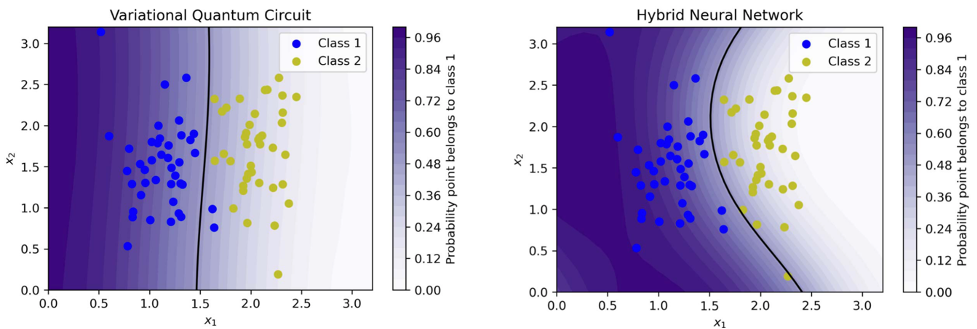Achievement: A team of researchers from the Oak Ridge National Laboratory (ORNL) developed a novel architecture for a hybrid quantum-classical neural network. As compared to the traditional quantum neural networks based on variational quantum circuits, the hybrid neural network achieves around 10% higher classification accuracy and 20% better minimization of the cost function on simulated quantum hardware.

Significance and Impact: The quantum neural networks based on variational quantum circuits have been the state of the art in quantum machine learning. However, they suffer from critical drawbacks such as poor accuracy and poor error. The hybrid quantum-classical neural network proposed in this work treats each neuron as a variational quantum circuit. This approach results in higher classification accuracy and lower error as compared to the state of the art. This approach sheds light on how quantum machine learning models, which are typically known to produce low accuracy and high error, can perform at par with, if not better than, classical machine learning approaches.
Research Details
- The proposed hybrid quantum-classical hybrid neural network was implemented using the IBM quantum computing platform
- Experiments were run on simulated as well as real quantum computers
- The hybrid neural network was compared with traditional quantum neural networks, which are based on variational quantum circuits
- The datasets used in these experiments were: 2x2 Bars and Stripes, a subset of Iris and synthetically generated real-valued data.
Facility: OLCF Quantum
Sponsor/Funding: LDRD Seed
PI and affiliation: Prasanna Date, ORNL
Team: Davis Arthur (University of Florida) and Prasanna Date (ORNL)
Citation and DOI: Arthur, Davis, and Prasanna Date. "Hybrid Quantum-Classical Neural Networks." In 2022 IEEE International Conference on Quantum Computing and Engineering (QCE), pp. 49-55. IEEE, 2022. DOI: 10.1109/QCE53715.2022.00023.
Summary: Deep learning is one of the most successful and far-reaching strategies used in machine learning today. However, the scale and utility of neural networks is still greatly limited by the current hardware used to train them. These concerns have become increasingly pressing as conventional computers are soon expected to approach the physical limitations that will slow their performance improvements in the near future. For these reasons, scientists have begun to explore alternative computing platforms, like quantum computers, for training neural networks. In recent years, variational quantum circuits have emerged as one of the most successful approaches to quantum deep learning on noisy intermediate scale quantum devices. We propose a hybrid quantum-classical neural network architecture where each neuron is a variational quantum circuit. We empirically analyze the performance of this hybrid neural network on a series of binary classification data sets using a simulated IBM universal quantum computer and a state-of-the-art IBM universal quantum computer. On the simulated hardware, we observe that the hybrid neural network achieves around 10% higher classification accuracy and 20% better minimization of the cost function than an individual variational quantum circuit. On the quantum hardware, we observe that each model only performs well when the qubit and gate count is sufficiently small.



